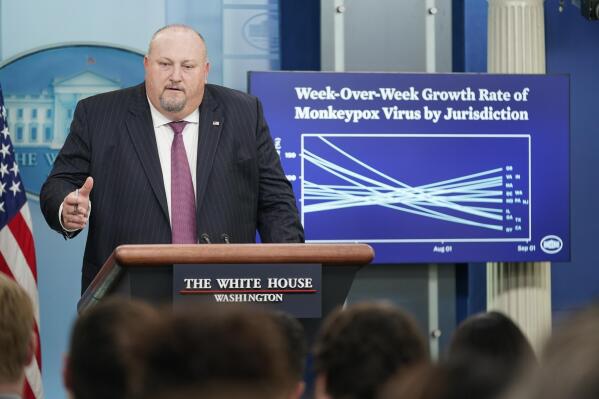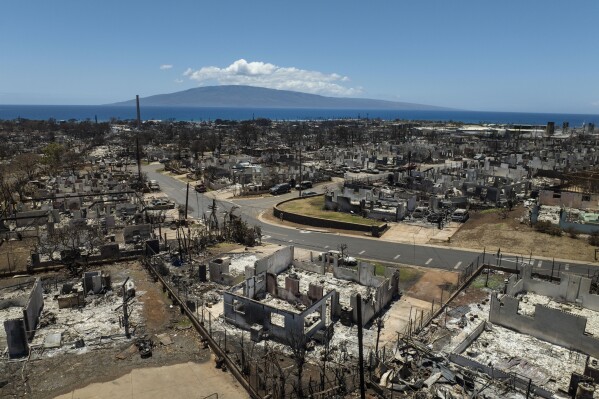Decades-old footage of Hawaiians being removed from parkland misleadingly shared online as recent
A man walks through wildfire wreckage Friday, Aug. 11, 2023, in Lahaina, Hawaii. The Associated Press on Friday, Sept. 8, 2023 reported on social media posts falsely claiming that a video shows police forcing native Hawaiians off their lands following the Maui wildfires. (AP Photo/Rick Bowmer)
CLAIM: A video shows native Hawaiians being evicted from their property after the Maui wildfires.
AP’S ASSESSMENT: False. The video is from a trailer for a documentary made nearly 40 years ago. It shows law enforcement officials evicting Hawaiians who had been living in Waimanalo Beach Park on the island of Oahu.
THE FACTS: A video is circulating on social media that purports to show native Hawaiians being forcibly removed from their homes in Maui in the aftermath of the devastating fires last month.
The roughly two-minute clip opens with a group of distraught young children and adults crying and pleading with uniformed police officers.
“Where you think we going? We no more house,” a furious young girl shouts at an officer in pidgin English as a woman attempts to hold her back.
The video then cuts to officers as they enter a makeshift dwelling, placing handcuffs on people sitting inside, physically carrying them out and loading them into police vehicles.
“If you’re coming to Hawaii watch this and keep this in mind when you’re here,” the text written over the video reads. “Send your love and ‘fight back’ energy to the Hawaiians. This must be stopped.”
“THIS IS HEART BREAKING! WHY IS THIS NOT BEING REPORTED???!!!” wrote a Facebook user who shared the video.
But the video is nearly 40 years old and doesn’t show the aftermath of the nation’s deadliest wildfire in more than a century, which ignited on Aug. 8 and claimed more than 100 lives. It didn’t even take place on Maui, but some 116 miles away on the Hawaiian island of Oahu.
The video is the trailer for a documentary about the June 3, 1985, eviction of Hawaiians living on Waimanalo Beach Park in the capital city of Honolulu.
The 37-minute long documentary was made by Nā Maka o ka ‘Āina, or “The Eyes of the Land,” a Hawaiian video production company run by filmmakers Joan Lander and Abraham “Puhipau” Ahmad.
“In 1985, a group of houseless native Hawaiians took a stand for their right to live at Waimānalo Beach Park, an area set aside as Hawaiian Home Lands,” a description of the documentary on the company’s website reads. “The resulting police action and violent eviction is the subject of this video. Iconic footage from this video has been used in numerous other documentaries around the world.”
Lander, in an email Friday, confirmed the clip being widely shared was the trailer for the documentary, which she said originally aired on public access stations and the local PBS station in Hawaii.
She said the footage captured a planned demonstration and the subsequent arrest of more than a dozen Hawaiians opposing local government efforts to clear beach parks where homeless Hawaiians were living in encampments.
“It was all planned out, to resist whatever police action might take place,” Lander explained. “But no one knew how the resulting struggle would actually play out. It got to be very emotionally devastating and physical, as the group of Hawaiians inside the shack, who had locked their arms together, were pulled, often violently, away and taken to the paddy wagons.”
Puhipau, who died in 2016, is also shown at the end of the widely shared clip and acknowledges he’s reporting from Waimanalo on Oahu.
“This is the most recent in a series of arrests and evictions from the beaches of Hawaii,” he explains, standing with a microphone on a pristine beach. “But with close to 90% of the people of Hawaii unable to afford their own homes, this incident will probably not be the last.”
___
This is part of AP’s effort to address widely shared misinformation, including work with outside companies and organizations to add factual context to misleading content that is circulating online. Learn more about fact-checking at AP.



